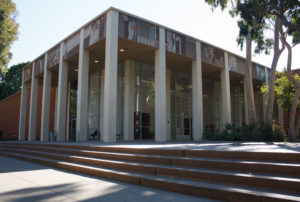For many, listening to folk music is a fun pastime or interest. However, for distinguished professor of anthropology Paul Kroskrity, the songs have far more meaning when it comes to social movements.
His Fiat Lux seminar – Anthropology 19: “Folk Songs as Protest: Tracing the Woody Guthrie Tradition” – explored the intersection between social protests and folk music, starting with Woody Guthrie and moving on to other artists such as Paul Seeger and Bob Dylan. Kroskrity said he hopes students will walk away appreciating folk protest songs and understanding their wider contribution to social movements.
“People really thought that these songs … correlated with movements that really did something,” he said. “The songs ultimately do have power in ways that I think we sometimes discount – as if, if you have a guitar, you can’t be a powerful person.”
Starting with Guthrie – whose famous songs include “This Land is Your Land” – allowed Kroskrity to introduce a thread of protest between folk songs, the professor said, adding that Guthrie wrote to advocate for economically oppressed individuals, migrant workers and others who were not part of the rich elite. Kroskrity added that while Guthrie’s songs did not motivate people to take direct action, his music did provide an opportunity to feel the pain of these people he wrote for.
Kroskrity said students completed a short reading assignment each week to discuss in class. Anna Gorman, a first-year cognitive science student, said students also listened to around 20 minutes of folk songs at the start of class.
Gorman said she took the class to foster relationships with a professor and peers in an environment where she feels more comfortable asking questions. Coming from a private high school with smaller class sizes, Gorman said she wanted to ensure that she had the opportunity to take those kinds of classes again, as opposed to her other courses with hundreds of students.
Fiat Lux classes are offered by members of the Academic Senate Faculty as one-unit seminars with class sizes of up to 20 students.
She said her favorite part of the course was learning about the true meaning of the song “This Land is Your Land,” since she had sung it in school.
“I grew up singing Woody Guthrie songs. … It’s very pro-American, the verse that we sing, but I’ve always been wanting to read it for myself and make my own decisions about what it means,” she said. “I had no idea that there were three other verses that are more politically radical that I had never heard of.”
Kevin Mohr, a fourth-year political science student, said he took the course because he did not know much about folk protest songs but has learned about their impact throughout the United States’ history.
“They (folk musicians) use music to unite people, get them to rally around a central sort of cause,” Mohr said. “You could use this music to steer the crowd in one direction and actually get some sort of meaningful change.”
Kroskrity said it is important to offer courses like Fiat Luxes to expose students to seminar-type experiences and allow them to more easily contribute.
Gorman said she appreciates the class because she has learned a lot despite the class’s low time commitment.
Both Gorman and Mohr said they would recommend the class, though Mohr specified that he thinks the class would be mainly of interest to students who like music.
“I’d recommend anyone who’s actually interested in expanding their mind taking the class,” he said. “Anyone who’s interested in developing who they are as a person.”
Kroskrity said the class is also important because the mid-1900s, when Woody Guthrie was writing, is similar to the present day, with high concentrations of wealth and poor worker conditions.
He added that he attended Columbia University during the Vietnam War, a prominent college campus for the anti-war movement. These protests were a defining factor of his education, he said, as they taught him about the way the world worked and caused him to reflect on his values.
“It’s painful to remember some of these things, but at the same time, I think it’s a good sign because it creates a kind of energy and a sense that we have to change things for the better,” Kroskrity said. “That’s the good side of protests and critique, and I feel like if that’s the kind of music that does that, I’d like to be behind that.”




Comments are closed.